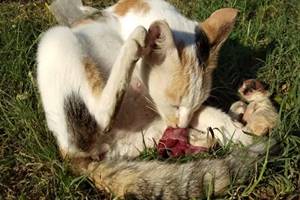Can Cats Eat Cold Food ? This Is The Answer !
Cats are often spoiled pets and have a distinctive appetite. When it comes to food, cat owners must pay attention to several important factors to ensure their health and comfort. One of the common questions that often arises is whether cats can eat cold food ?
In this article, we'll talk more about this and provide some insight into whether cats can eat cold food.
Cat Food Considerations
As a caring cat owner, it's important to understand the nutritional needs and healthy diet of cats. A proper cat diet should include foods that contain the proteins, fats, carbohydrates, vitamins and minerals needed for the growth and maintenance of their bodies. Well-balanced, specially designed commercial cat foods are often a good choice for meeting their nutritional needs.
Cold Food for Cats
Most cats prefer to eat food that is slightly warm or at least at room temperature. Food that is too cold can be unappealing to cats and may not stimulate their appetite. However, most cats will not experience serious health problems if they eat cold food.
However, there are a few things to consider when giving cold food to cats :
Risk of sensitive teeth: Some cats may have teeth that are sensitive to cold temperatures. If your cat has sensitive teeth or gum problems, feeding food that is too cold can cause discomfort or pain. You may want to choose foods that are warmer in temperature to avoid this problem.
Drastic temperature changes : If you give your cat very cold food, especially after a warm room temperature, the drastic temperature change can cause digestive discomfort. Cats prefer food with a more stable temperature and can digest it better.
Hygiene and safety: Make sure the food you serve is fresh and uncontaminated. Don't let cat food sit too long in warm room temperatures or too long in cold temperatures as this can trigger the growth of unwanted bacteria.
Feeding Recommendations For Cats
Giving cat food should not be done carelessly in order to maintain the health of cats. There are several recommended feeding recommendations for cats. Some of these recommendations include:
- Provision of healthy and special food for cats
Make sure the food given is cooked food
Giving food above refrigerator temperature to minimize the risk of tooth sensitivity problems in cats and so that food is more attractive to cats and their appetite
Use a safe container when heating cat food or a container made specifically for cats
Give food in reasonable portions and not too much to avoid the risk of obesity in cats
Always supervise your cat after eating food, if a problem occurs, you should immediately treat the cat to the vet
Conclusion
In general, cats can eat cold food without serious health problems. However, it should be noted that each cat has a different preference and tolerance for food temperature. Keep cat food clean and safe, and watch your cat's reaction and behavior when you give it cold food.
If you have further concerns or questions, it is best to consult your veterinarian for more specific advice regarding your cat.








